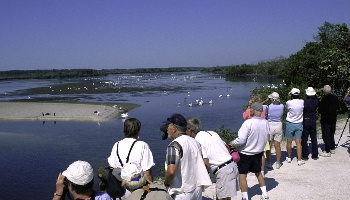Birdwatching
|
|
Birding or birdwatching is a hobby concerned with the observation and study of birds (the study proper is termed ornithology). The term "birding" is of American origin; "birdwatching" is (or more correctly, was) the commonly used word in the United Kingdom and Ireland and by non-birders in the United States. Since visual observation is routinely complemented with auditory observation, the term "birding" is more accurate, and is growing in usage, particularly among devotees of the hobby.
The most active times of the year for birding in the temperate zones are during spring and fall migration, when the greatest variety of birds may be seen, as many species that do not nest or overwinter in given areas may be observed as they make their way north or south.
Early morning is typically the busiest time of the day for birding since many birds are then at their hungriest, searching most actively for food, and thus are easier to find and observe. Success in locating the more interesting species typically requires detailed knowledge of their appearance, sounds, behavior, and most likely habitat, in addition to good measures of stealth and patience.
Birding can be one of the quieter and more relaxing outdoor activities. However, birders who are keen rarity-seekers will travel long distances to see a new species to add to the list of birds they have personally observed (life list, national list, state list, county list, year list, etc.). In Britain these fanatical birders are commonly known as twitchers, from the frenzy that descends on some when they receive news of a rare bird. The term may derive from one of its first proponents in the early 1960's, who used to arrive on his motorbike in freezing weather, still "twitching" from the cold. Some birders compete to build the biggest species lists. A North American one-day competition is called a "Big Day"; in Britain it is a "Bird Race". Teams trying to win such a competition or set the record for their designated area usually have to be in the field for twenty-four hours. They commonly drive hundreds of kilometers, and some record-chasers have employed private jets and helicopters in the enterprise.
Equipment commonly used for birding includes binoculars and a telescope or spotting scope with tripod, a notepad, and one or more field guides. Twitchers will also have a mobile phone and a pager in order to keep constantly informed of rare bird sightings. Knowledge of the weather is also important, since the right winds can lead to drift migration.
Twitching is probably most highly developed in the UK, The Netherlands and Ireland because their coastal locations add to the likelihood of rarities appearing there, and their small size makes it possible to reach any part of them (including most islands) in a few hours. In the United Kingdom there exists a particular twitchers' vocabulary which is surprisingly well developed and potentially confusing for the uninitiated.
Seawatching is a type of birdwatching where observers based at a coastal watchpoint, such as a headland, watch birds out at, or moving over, the sea.
Prominent national organizations concerned with birding include the British Trust for Ornithology and the RSPB in the United Kingdom, and the National Audubon Society and American Birding Association in the United States. Many statewide or local Audubon organizations are also quite active in the U.S.
Many birders take part in censuses of bird populations and their migratory patterns which are sometimes specific to individual species and sometimes count all the birds in a given area (as in a Christmas Bird Count). This citizen science can assist in identifying environmental threats to the well-being of birds or, conversely, in assessing the outcomes of environmental management initiatives intended to ensure the survival of at-risk species or encourage the breeding of species for aesthetic or ecological reasons. This more scientific side of the hobby is an aspect of ornithology.
Increasing (seasonal) bird populations can be a good indicator of biodiversity or the quality of different habitats. Some species may be persecuted as vermin, often illegally (e.g. the Hen Harrier in Britain), under the (usually false) perception that predatory species increase in number at the expense of other species of birds, insects, or smaller mammals. In most cases, the reverse applies, that the population of predatory species is controlled by the abundance of the prey species. There are therefore scientific reasons for some bird counts in defined geographic areas.
Photography has always been a part of birding, but in the past the cost of good cameras and long lenses made this a minority, often semi-professional, interest. The advent of affordable digital cameras which can be used in conjunction with binoculars or a telescope (a technique known as digiscoping) have made this a much more widespread aspect of the hobby.
| Contents |
Socio-Psychology of birdwatching
It has been suggested that birdwatching is a form of expression of the innate need for human connections to the environment. Ethologist Nikolaas Tinbergen considered birdwatching as an expression of the male hunting instinct.
Another intriguing connection has been that of the interest in birds by spies. Although the idea for James Bond arose from the author of a bird book, there have been several cases of spies who were serious ornithologists such as Sidney Dillon Ripley and Richard Meinertzhagen.
Celebrity birders
See also
- Big year
- birdfeeding
- Royal Society for the Protection of Birds
- List of birding journals and magazines.
External links
- Birdingonthe.net (http://birdingonthe.net/)
- Fatbirder (http://www.fatbirder.com/)
- Surfbirds Birding (http://www.surfbirds.com/)
- Worldtwitch - rare bird news around the world (http://worldtwitch.com/)
- BirdForum (http://www.birdforum.com)
- BirdGuides (http://www.birdguides.com)fa:پرندهنگری

